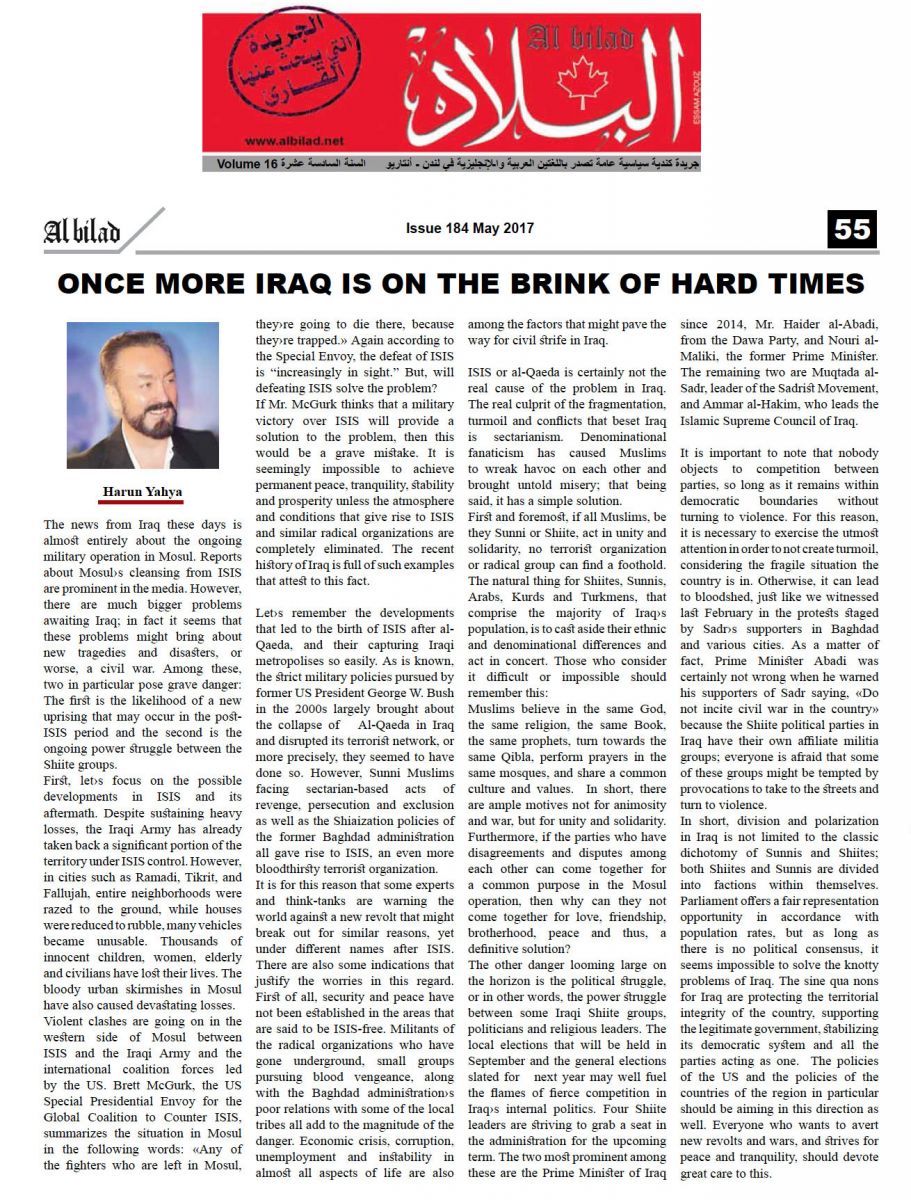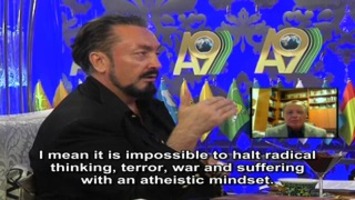Bigotry: The Dark Danger
Once more Iraq is on the brink of hard times

The news from Iraq these days is almost entirely about the ongoing military operation in Mosul. Reports about Mosul's cleansing from ISIS are prominent in the media. However, there are much bigger problems awaiting Iraq; in fact it seems that these problems might bring about new tragedies and disasters, or worse, a civil war. Among these, two in particular pose grave danger: The first is the likelihood of a new uprising that may occur in the post-ISIS period and the second is the ongoing power struggle between the Shiite groups.
First, let's focus on the possible developments in ISIS and its aftermath. Despite sustaining heavy losses, the Iraqi Army has already taken back a significant portion of the territory under ISIS control. However, in cities such as Ramadi, Tikrit, and Fallujah, entire neighborhoods were razed to the ground, while houses were reduced to rubble, many vehicles became unusable. Thousands of innocent children, women, elderly and civilians have lost their lives. The bloody urban skirmishes in Mosul have also caused devastating losses.
Violent clashes are going on in the western side of Mosul between ISIS and the Iraqi Army and the international coalition forces led by the US. Brett McGurk, the US Special Presidential Envoy for the Global Coalition to Counter ISIS, summarizes the situation in Mosul in the following words: "Any of the fighters who are left in Mosul, they're going to die there, because they're trapped." Again according to the Special Envoy, the defeat of ISIS is “increasingly in sight.” But, will defeating ISIS solve the problem?
If Mr. McGurk thinks that a military victory over ISIS will provide a solution to the problem, then this would be a grave mistake. It is seemingly impossible to achieve permanent peace, tranquility, stability and prosperity unless the atmosphere and conditions that give rise to ISIS and similar radical organizations are completely eliminated. The recent history of Iraq is full of such examples that attest to this fact.
Let's remember the developments that led to the birth of ISIS after al-Qaeda, and their capturing Iraqi metropolises so easily. As is known, the strict military policies pursued by former US President George W. Bush in the 2000s largely brought about the collapse of Al-Qaeda in Iraq and disrupted its terrorist network, or more precisely, they seemed to have done so. However, Sunni Muslims facing sectarian-based acts of revenge, persecution and exclusion as well as the Shiaization policies of the former Baghdad administration all gave rise to ISIS, an even more bloodthirsty terrorist organization.
It is for this reason that some experts and think-tanks are warning the world against a new revolt that might break out for similar reasons, yet under different names after ISIS. There are also some indications that justify the worries in this regard. First of all, security and peace have not been established in the areas that are said to be ISIS-free. Militants of the radical organizations who have gone underground, small groups pursuing blood vengeance, along with the Baghdad administration's poor relations with some of the local tribes all add to the magnitude of the danger. Economic crisis, corruption, unemployment and instability in almost all aspects of life are also among the factors that might pave the way for civil strife in Iraq.
ISIS or al-Qaeda is certainly not the real cause of the problem in Iraq. The real culprit of the fragmentation, turmoil and conflicts that beset Iraq is sectarianism. Denominational fanaticism has caused Muslims to wreak havoc on each other and brought untold misery; that being said, it has a simple solution.
First and foremost, if all Muslims, be they Sunni or Shiite, act in unity and solidarity, no terrorist organization or radical group can find a foothold. The natural thing for Shiites, Sunnis, Arabs, Kurds and Turkmens, that comprise the majority of Iraq's population, is to cast aside their ethnic and denominational differences and act in concert. Those who consider it difficult or impossible should remember this:
Muslims believe in the same God, the same religion, the same Book, the same prophets, turn towards the same Qibla, perform prayers in the same mosques, and share a common culture and values. In short, there are ample motives not for animosity and war, but for unity and solidarity. Furthermore, if the parties who have disagreements and disputes among each other can come together for a common purpose in the Mosul operation, then why can they not come together for love, friendship, brotherhood, peace and thus, a definitive solution?
The other danger looming large on the horizon is the political struggle, or in other words, the power struggle between some Iraqi Shiite groups, politicians and religious leaders. The local elections that will be held in September and the general elections slated for next year may well fuel the flames of fierce competition in Iraq's internal politics. Four Shiite leaders are striving to grab a seat in the administration for the upcoming term. The two most prominent among these are the Prime Minister of Iraq since 2014, Mr. Haider al-Abadi, from the Dawa Party, and Nouri al-Maliki, the former Prime Minister. The remaining two are Muqtada al-Sadr, leader of the Sadrist Movement, and Ammar al-Hakim, who leads the Islamic Supreme Council of Iraq.
It is important to note that nobody objects to competition between parties, so long as it remains within democratic boundaries without turning to violence. For this reason, it is necessary to exercise the utmost attention in order to not create turmoil, considering the fragile situation the country is in. Otherwise, it can lead to bloodshed, just like we witnessed last February in the protests staged by Sadr's supporters in Baghdad and various cities. As a matter of fact, Prime Minister Abadi was certainly not wrong when he warned his supporters of Sadr saying, "Do not incite civil war in the country" because the Shiite political parties in Iraq have their own affiliate militia groups; everyone is afraid that some of these groups might be tempted by provocations to take to the streets and turn to violence.
In short, division and polarization in Iraq is not limited to the classic dichotomy of Sunnis and Shiites; both Shiites and Sunnis are divided into factions within themselves. Parliament offers a fair representation opportunity in accordance with population rates, but as long as there is no political consensus, it seems impossible to solve the knotty problems of Iraq. The sine qua nons for Iraq are protecting the territorial integrity of the country, supporting the legitimate government, stabilizing its democratic system and all the parties acting as one. The policies of the US and the policies of the countries of the region in particular should be aiming in this direction as well. Everyone who wants to avert new revolts and wars, and strives for peace and tranquility, should devote great care to this.
Adnan Oktar's piece in Al Bilad
2017-05-05 16:22:02



